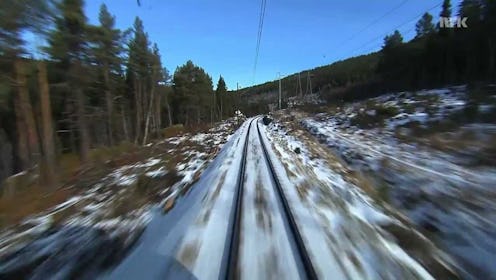News
This Airline Is Broadcasting Seven Hours Of What?

Airplanes are stressful. You've got crying babies, the dude who slumps onto your shoulder and snores, the blasting air vent pointed directly at you. But one airline is trying to lower your stress level... with British Airways' "Slow TV." This year, British Airways is introducing The Seven Hour Train Journey to Oslo on some of its long-haul flights. The title isn't deceptive: It is literally a film of a seven-hour train ride. To Oslo. Without any talking. Still, as silly as that might sound, it was a breakout hit in Norway when it debuted on national television, with an estimated one million people tuning in to watch the snowy ride.
British Airways' in-flight entertainment manager, Richard D'Cruze told AOL:
One of the team at our agency Spafax read about this unusual documentary and tracked it down. It fits perfectly with the "wallpaper" style footage people find mesmerising in-flight, such as our moving maps which customers watch for endless hours! There's definitely a hypnotic, calming and entertaining quality to "Slow TV" that is perfect for in-flight entertainment.
If popular, British Airways plans to add other soothing offerings to the mix, such as knitting, bird feeding, and a walk in the park. All they really had to do this whole time was show a few golf or tennis matches, but I guess they're catching on.
Named for both its length and pacing, "Slow TV" is already popular in Scandinavia. The Norwegian Broadcasting Company, the same channel that aired the train ride, broadcasted the entirety of a 134-hour journey on the MS Nordnorge as it made its way to Trollfjord in 2011. This style emulates early uninterrupted broadcasts like WPIX's Yule Log, a 1966 broadcast of a fireplace burning with Christmas music looping over it. Even now, you can find fireplaces to stream via Netflix.
The idea is that the shows are non-committal and mindless, which will lull you into a soothed state. In an interview with the Telegraph, Arve Hjelseth, a sociologist from the Norwegian University of Science and Technology, said the show's success lies in a renewed fascination with nature and the chaotic nature of modern TV.
“We're more stressed these days, too, so it's a time to relax as well as an antidote to modern TV, where camera angles shift every second," Hjelseth says. "So called 'slow-TV' is strangely calming."
I was good with the free booze, but hey. That's just me.